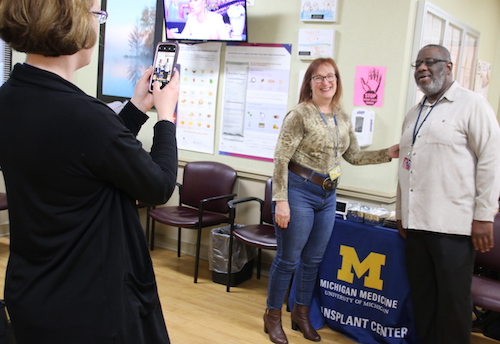
There are moments in life that you don’t forget. And, for Office of Metropolitan Impact Executive Director Tracy Hall, she’ll always remember a phone call received on a Tuesday.
Hall was at a work conference, often checking her phone because her husband, William, was at home and on dialysis for his failing kidneys. He was on a donor list, which had an average wait time of five years. Learning about living donors and paired kidney donation at a Michigan Medicine kidney transplant evaluation session, she had recently gone through testing with the hope to be a match for someone in need.
Noticing an incoming call from Michigan Medicine, anxiety crept in for a moment, with the ongoing medical emergencies and concern for her husband’s safety. So Hall stepped out of the conference session and into the hallway to answer it.
“I’ve got some great news. You’ve directly matched to your husband and can now move forward on donating a kidney to him.” She knew there was a slim chance she was a direct match, later learning it was only five percent, with their highly divergent physical backgrounds — she has European ancestry, he has African — she didn’t expect it.
“It was the impossible coming true. It gradually sank in that he could plan to return to a full life, no longer constrained by a machine to keep him alive,” says Hall, recalling the news she received on October 23, 2018. “My partner of nearly 30 years would have renewed health, energy and strength for the first time in well over 10 years. With that phone call, a world of new possibilities opened up before us.”
And now, following a successful kidney transplant last April, the couple is celebrating this month’s Valentine’s Day — also National Organ Donor Day — by working together to get the message out about organ donation. This week they spoke at Michigan Medicine Transplant Team’s Kidney Transplant Expo at the Dearborn Kidney Center. During the day-long session, they met with people on waiting lists, their families and potential donors, as well as clinic staff to speak about their experience and educate people about the process.
National Organ Donor Day is an observance day dedicated to bringing awareness on the importance of organ donation, how to sign up and giving recognition to people who have given and received a life-saving transplant.
According to the National Network for Organ Sharing, more than 112,500 people in the U.S. are waiting for an organ, with more than 40,000 transplants done in 2019. And there were more than 7,400 living donor transplants — Hall is included in that — in 2019, which is a new all-time high.
“William was a completely different person after the transplant. Even days after, his energy was back. He had that sparkle return to his eyes again. We could make future plans that weren’t medically related. The sudden transformation was shocking to us both,” Hall said. “Yes, I had surgery and there was a short recovery period, but to transform a life like that with relatively little effort on my part was a miracle to see.”
The couple calls the experience a miracle, and hope others can have the chance for success that they’ve had.
After having a personal experience as a teenager with losing a young family member to kidney failure, Hall worked as a lobbyist on behalf of a kidney dialysis company in the 1980s. It’s where she had one of her proudest professional accomplishments — getting Congress to pass a joint resolution to designate an observation day to raise awareness about kidney failure. National Kidney Day (Public Act 99-580) was signed into law by President Ronald Reagan, Senator Strom Thurmond and Speaker of the House Tip O’Neill Jr.
The date designated as the first National Kidney Day? October 23, 1986 — 32 years to the date of the Michigan Medicine phone call that changed their lives.




